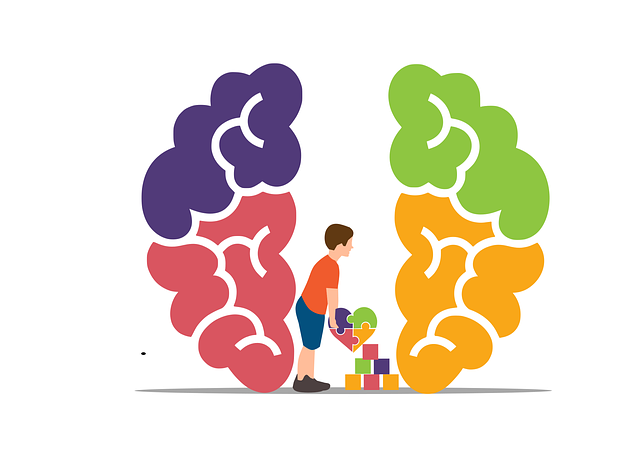The Resourceful Facilitation Method (RFM) offers an innovative, culturally relevant therapy approach tailored for German-speaking young adults facing identity challenges, academic pressures, and social expectations. By combining Compassion Cultivation Practices and Empathy Building Strategies, RFM enhances emotional regulation and interpersonal relationships. Podcast series and group sessions facilitated by trained professionals make resilience training accessible and engaging, fostering open dialogue about mental wellness. These exercises promote long-term benefits such as reduced anxiety, better decision-making, improved relationships, increased social activity, and academic performance, catering specifically to the needs of German-speaking young adults in therapy.
“Unleash resilience with RFM, a transformative approach in therapy for young adults. This article explores the power of RFM (Risk, Fear, Mastery) exercises in empowering individuals within the German-speaking community. We delve into its significance, offering a unique perspective on building resilience. From understanding risk factors to mastering fear-conquering techniques, we provide an extensive guide.
Learn effective implementation strategies, uncover long-term benefits, and discover how to measure success in resilience training tailored for German-speaking young adults.”
- Understanding RFM and its Relevance in Young Adult Therapy
- The German-Speaking Community: Unique Considerations for Resilience Building
- Effective Implementation Strategies for RFM Exercises
- Long-Term Benefits and Measuring Success in Resilience Training
Understanding RFM and its Relevance in Young Adult Therapy

In the realm of therapy for young adults, especially within German-speaking communities, Resourceful Facilitation Method (RFM) has emerged as a powerful tool to enhance therapeutic outcomes. RFM focuses on fostering resilience and empowering individuals to navigate life’s challenges with greater effectiveness. By understanding and utilizing client resources, therapists can facilitate meaningful change and promote personal growth. This approach is particularly relevant in addressing the unique needs of young adults, who often face pressures related to identity formation, academic demands, and social expectations.
The implementation of RFM involves a range of techniques, such as Compassion Cultivation Practices and Empathy Building Strategies, aimed at improving emotional regulation and interpersonal connections. Through these methods, therapists support clients in developing coping skills and building resilience, enabling them to adapt and thrive despite life’s adversities. By integrating RFM into therapy sessions, German-speaking therapists can offer a tailored and effective approach that resonates with young adults seeking guidance and personal development within their cultural context.
The German-Speaking Community: Unique Considerations for Resilience Building

The German-speaking community presents unique challenges when it comes to resilience building exercises and RFM (Recall, Feeling, Meaning) therapy for young adults. Cultural nuances often influence how individuals process trauma and seek support for their mental wellness. In many German-speaking countries, there is a strong emphasis on self-reliance and independence, which may deter some young adults from openly discussing emotional challenges or seeking professional help. This cultural context requires tailored approaches to make therapy for young adults German speaking accessible and appealing.
One way to bridge this gap is through innovative formats like the Mental Wellness Podcast Series Production. By creating engaging audio content, therapists can offer emotional healing processes that are more accessible and less intimidating than traditional face-to-face sessions. This approach allows individuals to explore their mental wellness in a private and convenient manner, potentially encouraging open dialogue about resilience building and RFM techniques within the German-speaking community.
Effective Implementation Strategies for RFM Exercises

Implementing RFM (Resilience, Flexibility, and Mastery) exercises effectively requires a structured approach tailored to the needs of young adults seeking therapy in German-speaking regions. One key strategy is to integrate these practices into existing mental wellness podcast series production, making them accessible and engaging for a modern audience. By incorporating emotional regulation techniques and trauma support services within the podcast format, professionals can offer valuable tools for self-improvement and resilience building.
Additionally, group sessions led by trained facilitators create a supportive environment where young adults can share their experiences, fostering a sense of community. These sessions should be designed to promote active participation, encouraging open dialogue about challenges faced and successful coping mechanisms. Regular feedback from participants ensures the exercises remain relevant and effective, catering to the unique needs of this demographic.
Long-Term Benefits and Measuring Success in Resilience Training

Resilience training offers long-term benefits for young adults seeking therapy, especially those fluent in German speaking regions. By integrating these exercises into their lives, individuals develop enhanced coping mechanisms that enable them to navigate challenging situations with greater ease. This builds mental fortitude, allowing them to bounce back from setbacks and maintain emotional balance.
Measuring the success of resilience training involves assessing improvements in self-care practices, conflict resolution techniques, and stress reduction methods. Over time, participants may report reduced levels of anxiety and depression, improved decision-making abilities, and enhanced relationships. Observational changes, such as increased participation in social activities and better academic performance, can also serve as indicators of successful resilience building exercises tailored for young adults receiving therapy in German-speaking areas.
Resilience is a cornerstone of well-being, especially for young adults navigating life’s challenges. Implementing RFM (Resourceful Functioning and Mastery) exercises in therapy sessions for this demographic, as highlighted by the unique considerations within the German-speaking community, offers a powerful approach to building emotional resilience. By employing effective strategies, therapists can help clients cultivate coping skills that promote long-term mental health. As the field of Young Adult Therapy continues to evolve, integrating RFM into practice proves to be a valuable asset, ensuring individuals emerge with enhanced resilience and a brighter outlook on life.








